|
|
|
Sort Order |
|
|
|
Items / Page
|
|
|
|
|
|
|
| Srl | Item |
| 1 |
ID:
123032
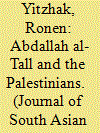

|
|
|
| 2 |
ID:
086504
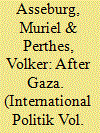

|
|
|
|
|
| Publication |
2009.
|
| Summary/Abstract |
The war in Gaza seems to be over even if the cease-fire is shaky. A European-American initiative could now create the conditions for something more durable, which addresses the security needs of both Israelis and Palestinians. To do so, Syria and Hamas must be engaged in the peace process
|
|
|
|
|
|
|
|
|
|
|
|
|
|
|
|
| 3 |
ID:
146854
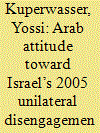

|
|
|
|
|
| Contents |
Brig.-Gen. Yossi Kuperwasser served as the head of the Research Division for Military Intelligence of the Israel Defense Forces in 2005 at the time of the disengagement from Gaza and parts of Northern Samaria. Because of his special vantage point he is able to bring a new insight to the subject. Intelligence professionals were not consulted in the decision-making process. While the Prime Minister and his confidants hoped that this initiative would result in a political advantage for Israel and strengthen its security, it is clear that they did not take possible Arab and Palestinian reactions into account, particularly those of Hamas. In this article Brig.-Gen. Kuperwasser presents the issue of disengagement from a fresh perspective and describes its unintended consequences, which could have been foreseen.
|
|
|
|
|
|
|
|
|
|
|
|
|
|
|
|
| 4 |
ID:
171549
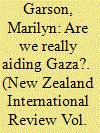

|
|
|
|
|
| Summary/Abstract |
Marilyn Garson discusses the effect of donor states’ actions upon Palestinian lives in the blockaded strip.
|
|
|
|
|
|
|
|
|
|
|
|
|
|
|
|
| 5 |
ID:
115084
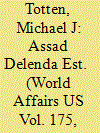

|
|
|
|
|
| Publication |
2012.
|
| Summary/Abstract |
Syria's tyrant Bashar al-Assad is in the middle of a life-or-death struggle. He might be overthrown. He should be.
The Arab Socialist Baath Party regime, beginning with its founder Hafez al-Assad and continuing through the rule of his son Bashar, is the deadliest state sponsor of terrorism in the Arab Middle East. It assisted the bloodthirsty insurgency in Iraq that killed American soldiers by the thousands and murdered Iraqi civilians by the tens of thousands. It has used both terrorism and conventional military power to place Lebanon under its boot since the mid-1970s. It made Syria into the logistics hub for Hezbollah, the best-equipped and most lethal non-state armed force in the world. It has waged a terrorist war against Israel and the peace process for decades, not only from Lebanon, but also from the West Bank and Gaza. And it is Iran's sole Arab ally and its bridge to the Mediterranean.
|
|
|
|
|
|
|
|
|
|
|
|
|
|
|
|
| 6 |
ID:
105002
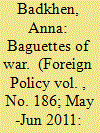

|
|
|
|
|
| Publication |
2011.
|
| Summary/Abstract |
In Egypt, Tunisia, and Yemen, men demonstrated wearing frying-pan basinets. Tin-pot cervellieres. Water-bucket shakos. The green, plastic chain mail of a wastebasket. A young man trussed a rumpled trio of empty water bottles to his head with a swatch of torn bed linen. A protester in Sanaa taped two baguettes and an unleavened pancake of chapati to his skull.
|
|
|
|
|
|
|
|
|
|
|
|
|
|
|
|
| 7 |
ID:
108307
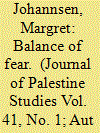

|
|
|
|
|
| Publication |
2011.
|
| Summary/Abstract |
This article looks at the use of ultra-short-range rockets by Palestinian militant factions in the Gaza Strip as part of the overall dynamic of the Israeli-Palestinian conflict and as a tool employed within internal Palestinian rivalries. Against the background of the gross military asymmetry between the parties to the conflict, it assesses the strategic utility of the rockets, including their psychological value as an "equalizer" to Israeli attacks. The article scrutinizes Israel's options to counter the rocket threat and identifies steps toward containing violence in Gaza. While bearing in mind that several Palestinian militant groups are involved in the production, acquisition, and firing of rockets, this article focuses on Hamas because, due to its leadership role in the Gaza Strip, a solution for the rocket issue will not be found without factoring in and providing a role for the Islamic organization.
|
|
|
|
|
|
|
|
|
|
|
|
|
|
|
|
| 8 |
ID:
099171
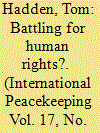

|
|
|
|
|
| Publication |
2010.
|
| Summary/Abstract |
The achievement of the objectives of international security, peacekeeping operations and peace enforcement, like the operations in Iraq and Afghanistan after the initial invasions, and of unilateral security operations, like those in Chechnya, Lebanon and Gaza, is often threatened by high levels of civilian casualties and physical destruction. Much of this is legitimized under the laws of armed conflict, notably the principles of legitimate military objectives and collateral damage, but would be contrary to human rights standards. This article argues that the claim that the laws of armed conflict and human rights are complementary is misleading and that international and national security, peacekeeping and peace-enforcement operations designed to protect and promote human rights should in principle be conducted under human rights standards. It explains how this could be achieved for international operations conducted under the auspices of United Nations Security Council Resolutions and/or status-of-forces agreements.
|
|
|
|
|
|
|
|
|
|
|
|
|
|
|
|
| 9 |
ID:
115491
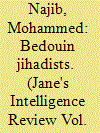

|
|
|
| 10 |
ID:
087015
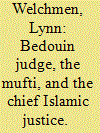

|
|
|
|
|
| Publication |
2009.
|
| Summary/Abstract |
This article examines competing legal frameworks in dispute resolution in the occupied territories, against the background of weakening central authority, bitter political rivalries, and increasing insecurity on the ground. Two case studies from 2005 are presented-a killing in Gaza and an attempted sexual assault in the West Bank-where the involved parties had recourse to three distinct but overlapping bodies of law, not all of which were part of the formal Palestinian legal system: statutory law, Islamic law, and customary (or tribal) law. The resolution of these cases, while shedding light on the intersection of local politics and alternative legal systems, underscores the challenges of forging a united legal system in a situation of occupation, weak government, and heterogeneous legal heritage.
|
|
|
|
|
|
|
|
|
|
|
|
|
|
|
|
| 11 |
ID:
131978
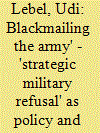

|
|
|
|
|
| Publication |
2014.
|
| Summary/Abstract |
The study shows how 'strategic military refusal' in Israel developed as a rational and institutional means to influence security policies. As opposed to the perspective that sees military refusal as a spontaneous individual act, the study illustrates how organizations operate to distribute military refusal in order to pressure decision-makers to change their military policies. This strategy has proven to be effective when the military is involved with groups that threaten it with refusal - which threatens the military's operational ability and its official and apolitical image. These include soldiers whose civilian authorities, rather than their military commanders, are perceived as an epistemic authority regarding security issues. The case study refers to the impact of strategic military refusal in Israel on security policies and the military doctrine. This was influenced by leftist groups, which, although they belonged to the parliamentary opposition, had dominant presence in the military ranks. Furthermore, the study examines the effect of the use of strategic military refusal on the model of military recruitment.
|
|
|
|
|
|
|
|
|
|
|
|
|
|
|
|
| 12 |
ID:
169414
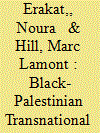

|
|
|
|
|
| Summary/Abstract |
This introductory essay outlines the context for this special issue of the Journal of Palestine Studies on Black-Palestinian transnational solidarity (BPTS). Through the analytic of “renewal,” the authors point to the recent increase in individual and collective energies directed toward developing effective, reciprocal, and transformative political relationships within various African-descendant and Palestinian communities around the world. Drawing from the extant BPTS literature, this essay examines the prominent intellectual currents in the field and points to new methodologies and analytics that are required to move the field forward. With this essay, the authors aim not only to contextualize the field and to frame this special issue, but also to chart new directions for future intellectual and political work.
|
|
|
|
|
|
|
|
|
|
|
|
|
|
|
|
| 13 |
ID:
085030
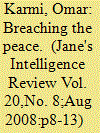

|
|
|
| 14 |
ID:
089992


|
|
|
|
|
| Publication |
2009.
|
| Summary/Abstract |
The radical Hamas leadership in Damascus was remarkably successful in goading the moderate Israeli to approve a massive attack on the Gaza Strip, but it has been notably less successful in reestablishing the putative cease-fire that had obtained since June 2008.
|
|
|
|
|
|
|
|
|
|
|
|
|
|
|
|
| 15 |
ID:
095691
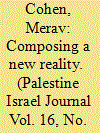

|
|
|
| 16 |
ID:
121450
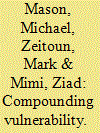

|
|
|
|
|
| Publication |
2012.
|
| Summary/Abstract |
Coping with (and adapting to) climatological hazards is commonly understood in intergovernmental and aid agency fora as a purely technical matter. This article examines the UN Development Programme's stakeholder consultations in the West Bank and Gaza Strip in order to challenge the donor-driven technical-managerial framing of Palestinian climate vulnerability by showing how Israeli occupation practices exacerbate environmental stresses. While emphasizing the importance of social, economic, and political contexts in shaping populations' responses to climate change in general, the authors demonstrate the multiple ways in which the occupation specifically compounds hazards reveals it as constitutive of Palestinian climate vulnerability.
|
|
|
|
|
|
|
|
|
|
|
|
|
|
|
|
| 17 |
ID:
124356
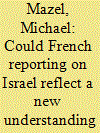

|
|
|
|
|
| Publication |
2012.
|
| Summary/Abstract |
The media in France show an inordinate interest in the Middle East and more specifically in the Palestinian issue and Israel. Not a day passes without a news item, an article, and several blog posts on the subject. Each year ushers in a new crop of essays on this topic, while other weighty matters, such as human rights in China or the neverending food crisis and endemic corruption in Africa get short shrift. The subject never fails to fascinate the public. Writing about the settlements or the blockade of Gaza will prompt hundreds of talkbacks, a fact well known to editors of websites such as Rue891, which rely heavily on advertising to survive.
|
|
|
|
|
|
|
|
|
|
|
|
|
|
|
|
| 18 |
ID:
160938
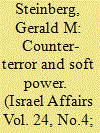

|
|
|
|
|
| Summary/Abstract |
For many years, the network of non-governmental organizations (NGOs) claiming a human rights agenda has consistently sought to delegitimise Israel’s counterterrorism strategy. This phenomenon was prominent during the 2008–2009 and 2014 Gaza wars, when these groups issued hundreds of statements condemning Israel, and in campaigns calling for UN commissions of inquiry (e.g. the Goldstone and Schabas/Davis investigations) into Israeli ‘war crimes’. NGO allegations were also the foundations of lawfare, including efforts to prosecute Israeli officials in the International Criminal Court and other venues, and for BDS campaigns against Israeli and Jewish targets. In this soft-power strategy, the perception of NGO officials as ‘security experts’ provides a major source of legitimacy, lending credence to their reports, despite the lack of credible fact-finding methodologies. Similarly, NGO legal analyses, based on problematic and aspirational interpretations, are accepted and echoed widely, without independent verification. In response, the IDF and Ministry of Defence first ignored and then sought to engage the NGOs in order to persuade them to accept Israeli perceptions and counterterror policies. When these responses failed, the emphasis shifted to countering NGO credibility in legal and diplomatic venues, which has also had limited impact to date.
|
|
|
|
|
|
|
|
|
|
|
|
|
|
|
|
| 19 |
ID:
097369
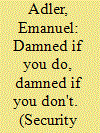

|
|
|
|
|
| Publication |
2010.
|
| Summary/Abstract |
This article seeks to initiate a new round of strategic intellectual innovation in an era when threats posed by non-state terrorist organizations and their state supporters do not resemble Cold War threats. Based on an interpretative sociological reading of the concepts of power, security, and rationality, it argues that a "damned if you do, damned if you don't" dilemma is to the post-Cold War era what the danger of surprise attack or unintended nuclear war was to the Cold War: the defining structural threat of international politics. The dilemma leaves states confronting asymmetrical warfare with the choice of reacting with force to a terrorist act or practicing appeasement. Neither approach, however, can achieve the goal of putting an end to terrorism. Deterrence sustains the dilemma by providing a rationale for why force should be used and why self-restraint is irrational. This article proposes a third option, defusing, which may be accomplished by denial (preventing provocateurs from dragging states into the use of force) and restructuration (transforming the structure and rules of the situation). Defusing relies on "performative power"-the capacity to project a dramatic and credible performance on the world stage and to decouple social actors, their audiences, and their most deeply held strategic beliefs. The force of the argument is illustrated by examples from the global "war on terror," the 2006 Lebanon War, the 2008-09 operation "Cast Lead" in Gaza, and the Iranian nuclear crisis.
|
|
|
|
|
|
|
|
|
|
|
|
|
|
|
|
| 20 |
ID:
123198


|
|
|
|
|
| Publication |
2013.
|
| Summary/Abstract |
THE GROWING instability in Egypt's Sinai Peninsula represents one of the most dangerous, and most anticipated, crises in the Middle East. Even before the 2011 Egyptian revolution, the security vacuum in the Sinai allowed criminals and terrorists, including those with an ideology akin to Al Qaeda's, to expand their operations. In the chaos after the revolution, these problems have worsened. Meanwhile, various Palestinian groups use the Sinai as a launching pad for attacks against Israel.
|
|
|
|
|
|
|
|
|
|
|
|
|
|
|
|
|
|
|
|
|